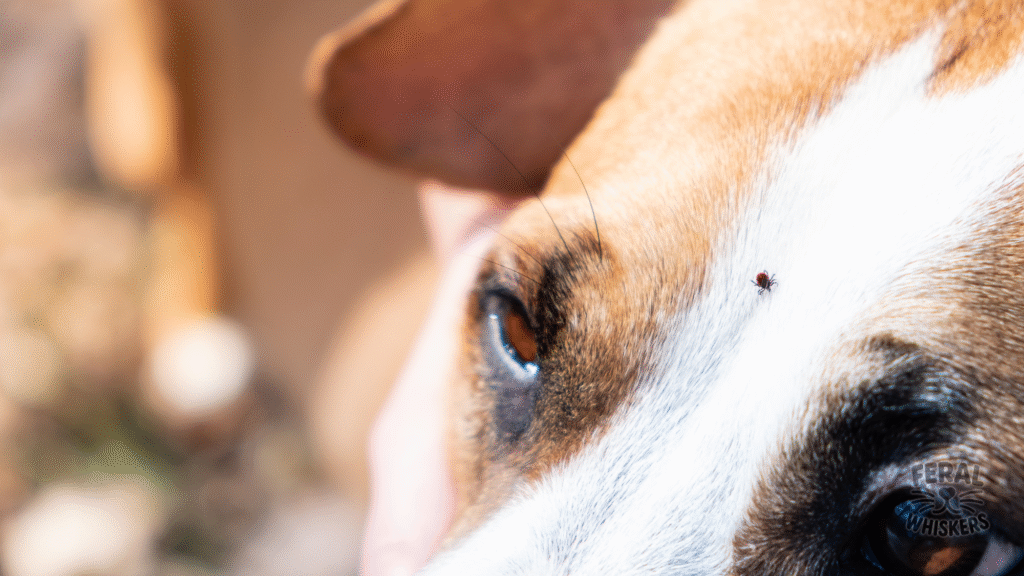Why Hepatozoonosis Matters

Unlike most tick-borne infections (where dogs are bitten by ticks), Hepatozoonosis is acquired when a dog actually ingests the tick itself.
This could happen:
- while grooming (chewing themselves to relieve itching, accidentally swallowing ticks),
- when eating prey animals (rodents, rabbits) that are carrying infected ticks,
- or even during curious puppy behavior like chewing leaves, dirt, or insects.
What makes Hepatozoonosis especially devastating is its ability to infiltrate the dog’s white blood cells and tissues, particularly muscles. Over time, this can create chronic pain, fever, weakness, and wasting — sometimes leading to a reduced lifespan in severe cases like Hepatozoon americanum.
How Dogs Get Hepatozoonosis
- Eating a Tick: The main mode of transmission. Unlike Lyme or Ehrlichia where tick saliva transmits bacteria during feeding, Hepatozoon parasites require the dog to swallow the tick containing the infective stage.
- Eating Infected Prey: Rodents, rabbits, and even birds can carry Hepatozoon-infected ticks. A dog that eats such an animal may indirectly swallow the parasite.
- Blood Transfusions: If donor blood is not screened (especially in endemic regions), the parasite can transfer directly.
➡️ This unique transmission route is why kennel dogs, hunting dogs, and strays are often more at risk compared to pampered indoor pups.
Symptoms of Hepatozoonosis in Dogs
The exact clinical picture depends on whether it’s H. canis (milder) or H. americanum (severe).
Hepatozoon canis (milder infection):
- Fever: Often intermittent. Not always noticed in strong, adult dogs but may show as mild lethargy.
- Weight Loss: Even if eating normally, the body wastes energy fighting low-grade infection.
- Enlarged Lymph Nodes: Early immune system defense.
- Lethargy & Weakness: The “can’t shake it off” kind of sickness, making dogs less playful.
- Mild Anemia: Shows as pale gums and reduced stamina.
Many dogs with H. canis may remain carriers without showing serious illness, unless stressed, immunocompromised, or malnourished.
Hepatozoon americanum (severe infection):
- Recurring High Fever: The parasite cycles cause repeated flare-ups.
- Severe Muscle and Joint Pain: Dogs show reluctance to move, walk stiffly, or whine when touched.
- Muscle Wasting: Over time, cysts (called “onion-skin cysts”) form in muscles, leading to pain and visible weight loss.
- Eye Discharge: Watery, sometimes with mucus, due to systemic inflammation.
- Bloody Diarrhea: From intestinal lining damage.
- Swelling of Body Tissues: Hind legs, abdomen, or face (edema).
- Neurological Issues: Tremors and seizures in late stages.
⚠️ H. americanum can cause death within 12 months of clinical symptoms without treatment, making it a very aggressive disease.
When to See a Vet 🩺
Any of these signs paired with possible tick exposure or hunting behavior history should trigger a vet visit:
- Recurrent unexplained fevers.
- Dog seems weak, wasting away despite being fed.
- Signs of significant muscle or joint pain that aren’t explained by injuries.
- Chronic diarrhea or bloody stools.
- Puppy or stray from a southern U.S. / tropical region with constant illness.
👉 Because Hepatozoonosis often looks like other diseases (parvo, ehrlichiosis, even cancer), history of tick environments + unusual weakness is often the missing clue.
Diagnosis
- Blood Smear: A vet may identify parasites inside white blood cells, but detection is inconsistent.
- Muscle Biopsy: In H. americanum, cysts in muscle tissue can confirm diagnosis.
- PCR Testing: Gold standard for species identification using DNA.
- Bloodwork Findings: Inflammation, anemia, and in some cases high white cell counts indicate systemic disease.
Diagnosis is challenging — vets often combine clinical suspicion + lab findings + region prevalence before confirming.
Veterinary Treatment
There is currently no full cure. Treatment is long-term and focused on management.
- Hepatozoon canis: More responsive. Often controlled with Imidocarb diproprionate injections. Dogs may even live normal lives if otherwise healthy.
- Hepatozoon americanum: Much harder to manage. Treated with:
- Triple drug therapy (clindamycin, potentiated sulfonamides, and pyrimethamine).
- Decoquinate (anticoccidial drug) for long-term suppression — sometimes lifelong.
- Pain management with NSAIDs or other safer alternatives.
💡 Important point: Relapses are common, especially with H. americanum. Most dogs require lifelong medication cycles to keep symptoms suppressed.
Holistic Support 🌿
Holistic care is essential for Hepatozoonosis because this is a chronic disease that drains body reserves over time. Holistics boost resilience even when mainstream medicine can’t fully cure it.
🥣 Healing Diet Support
Focus: muscle repair, immune strength, and anti-inflammatory foods.
- Proteins: essential for rebuilding lost muscle mass → chicken, turkey, salmon, eggs.
- Iron & Minerals: beef, liver (small amounts), pumpkin.
- Antioxidants: blueberries, kale, carrots, broccoli → repair cell damage.
- Omega‑3s: fish oil or sardines reduce muscle inflammation.
- Bone broth: heals gut, hydrates, soothes sick dogs.
👉 Muscle-Healing Stew Recipe:
- 1 cup boiled turkey or salmon
- ½ cup quinoa (muscle-friendly carb)
- ¼ cup kale or spinach (antioxidants)
- 2 tbsp bone broth
- 1 tsp fish oil
Served warm in small meals to weak dogs.
🌿 Herbal & Supplement Support
- Milk thistle – Liver protective. Essential if on continuous drug therapy.
- Medicinal mushrooms (Reishi, Cordyceps, Turkey Tail) – Boost immunity, fight fatigue.
- MSM + glucosamine – For muscle and joint pain relief.
- Turmeric + black pepper – Potent anti-inflammatory blend.
- Astragalus – Enhances white blood cell efficiency (vet-guided).
- Probiotics & digestive enzymes – Restore gut function after long antibiotics.
Prevention

Since there’s no vaccine for Hepatozoonosis, prevention is 100% about controlling ticks and prey exposure.
✅ Veterinary Prevention
- Year-round flea and tick preventatives → chewables (NexGard, Simparica, Bravecto).
- Tick collars or spot-ons as added layers.
✅ Lifestyle Prevention
- Never allow dogs to hunt or eat rodents, rabbits, or feral prey.
- Stop self-grooming ingestion of ticks by regularly checking and removing ticks manually.
- Clean kennels thoroughly → brown dog ticks thrive indoors.
✅ Holistic Prevention
- Herbal sprays with neem oil, apple cider vinegar, or cedarwood for added natural tick defense.
- Boost immunity naturally with anti-inflammatory diet staples: sardines, pumpkin, blueberries, turmeric.
Long-Term Outlook
- Hepatozoon canis: Often manageable with treatment + nutrition, sometimes lifelong carriers without major issues.
- Hepatozoon americanum: Prognosis is guarded — many dogs live only 12–18 months untreated, but with management they can live longer, often with recurring painful flare-ups. Lifelong medication cycles are common.
Holistic and dietary approaches can significantly improve quality of life and lengthen survival time.
Human Safety
Great news: Hepatozoonosis is NOT zoonotic. Humans cannot catch it from dogs or ticks. It’s strictly a canine/wildlife problem.
Facts
- Dogs can get Hepatozoon but not cats (species-specific).
- H. americanum is nicknamed the “American canine malaria” because of its relapsing fever cycles.
- The parasite can actually be passed down from mother to puppies, even if the mother doesn’t look sick.
FAQs
Can a dog recover completely?
For H. canis, yes sometimes. For H. americanum, relapses are likely — management more than cure.
Can healthy carriers infect others?
Not directly, but ticks feeding on carriers can spread it further.
Can my indoor dog get it?
Very unlikely — except in tick-infested kennels. Highest risk is hunting, stray, or outdoor dogs.
How is it different from Babesiosis?
Babesia destroys red blood cells (anemia). Hepatozoon invades white blood cells and muscles (pain, wasting).
Final Takeaway
Hepatozoonosis is one of the most unusual and severe tick-related infections in dogs. Instead of tick bites, dogs become infected when they eat an infected tick or prey animal.
- H. canis is mild and manageable.
- H. americanum causes chronic pain, fever, diarrhea, and wasting with no complete cure.
With lifelong medical management, holistic diet, herbal remedies, and strict tick prevention, many dogs can live longer, more comfortable lives.

